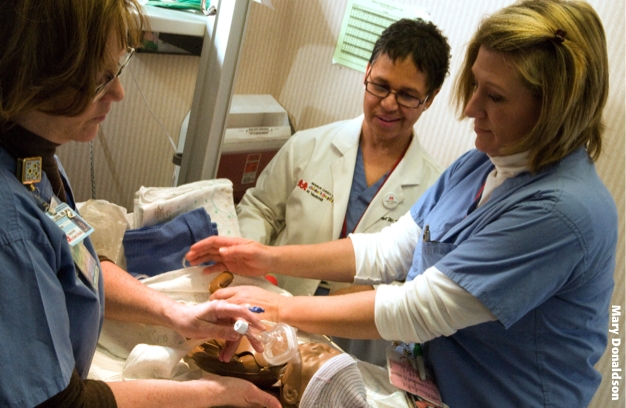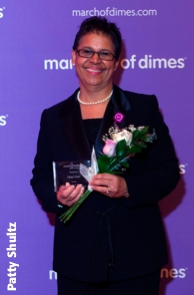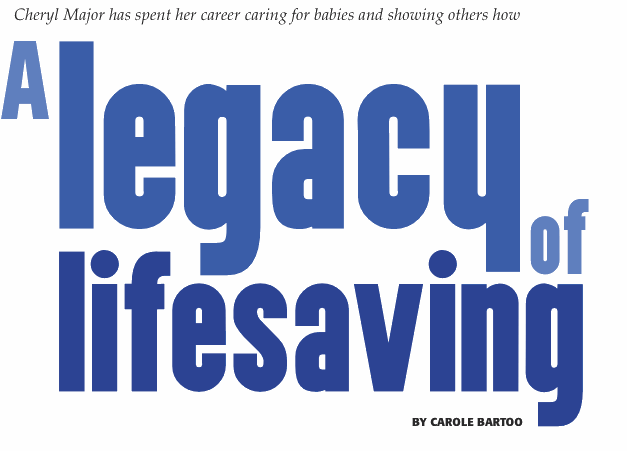A Legacy of Lifesaving
Cheryl Major, R.N., may have saved more babies than anyone in the state of Tennessee.
Some of them she has saved in person as a neonatal nurse. Many more she has saved by providing lifesaving skills to others who care for fragile newborns.
If you spend any time at all at the Monroe Carell Jr. Children’s Hospital at Vanderbilt, you’ve likely seen her: pushing carts of CPR training equipment through the halls or hosting information sessions about March of Dimes events. She is cheerful and busy inside the hospital, but it’s what she accomplishes outside its walls that is truly amazing—even historic.
“She is a remarkable person and a consummate teacher who is known and respected throughout the state,” said Judy Aschner, M.D., chief of the Division of Neonatology at Vanderbilt.
“Virtually every provider of neonatal or obstetrical care in the State of Tennessee knows Cheryl. Yet outside of the division, relatively few people at Vanderbilt realize what she has done or are aware of her regional and national stature.”
Pioneer
As an African American nurse, Major had to struggle to break into her career. She was a pioneer in many ways, not the least of which was helping to launch the new field of neonatology in the 1970s.
When she came to Vanderbilt in 1968, fresh from a BSN program in Pennsylvania, Major was looking for a night-shift job working with infants. At the time, Mildred Stahlman, M.D., professor of Pediatrics, was running a new type of unit for premature infants that was rapidly developing techniques and therapies to help babies survive.
The growing Vanderbilt neonatal intensive care unit (NICU) needed a nurse for the night shift, so the fit was perfect. Major took the job, but, as things worked out, she did not stay on the night shift for long.
In 1972, Stahlman approached Major with the idea for a brand new role, one that the State of Tennessee had never had before. Stahlman, her colleagues in neonatal health care and advocates from the March of Dimes had convinced state officials to draw up legislation that would create a regionalized system. Three lead hospitals, including Vanderbilt, would set standards for care of premature infants and work to see that all infants received the care they needed, regardless of where they were born.
And so Major became the first Neonatal Outreach Coordinator for the Middle Tennessee region, which meant that she was going to be the agent of change in how babies were cared for. Stahlman knew that Major was the right person for the job.
“You cannot have wholesale change without people like Cheryl. She is a great teacher who brings people to the table through nurturing,” Stahlman said.
“A terrible infant mortality rate”
In the early 1970s, many premature babies born in Tennessee simply died.
“We had a terrible infant mortality rate, it was something like 20 deaths per thousand, and I wanted to help spread the word about special care units,” Major said.
The job required travel to hospitals to teach the staff how to help babies survive premature birth and to educate them about conditions in which babies would benefit from transfer to the Vanderbilt NICU.
As Major got to know the delivery hospitals, and they developed a deep respect for her and the work at Vanderbilt, babies began to arrive at Vanderbilt in greater numbers with emotionally distressed parents. How they arrived was often tragic.

“Sometimes, they would arrive in the car with dad—this was a time before we had EMS. The babies would be sent by community physicians as they learned about Dr. Stahlman,” said Major.
Over time, it became obvious that having great care was often not enough without good transport. Babies were dying on the way to the hospital.
“During one particular time, we had three babies [in a short time] dead on arrival. I said that was it. We cannot tolerate them dying on the way. We considered that you couldn’t run an ICU and accept babies if you couldn’t do transport,” Stahlman recalled.
Major stepped up again and accepted the task of developing a safe transport system for sick babies, which became known as Angel transport.
Bread truck angel
The first Angel transport unit hit the roads in Middle Tennessee and Southern Kentucky on August 1, 1974, with Major as the program manager.
“We went to a Chevy dealership and bought a bread truck,” recalls Major. “The skilled electrician and apparatus shop staff at Vanderbilt converted it into an ambulance, with supplies and equipment that functioned as a mobile intensive care unit.”
Major recalls occasions when the Angel transport was pulled over in small towns after authorities spotted a stranger driving the odd-looking vehicle. The operation was so new there were no standard uniforms, badges or credentials.
“Sometimes we had to convince the police we were en route to pick up a very sick baby. On one occasion, after they talked to their local physician, they gave us an escort,” Major said. “But once we arrived at these small hospitals, we would show the staff how to start an IV, or intubate the baby, and they would show their gratitude by bringing us sausage and biscuits and gravy.”
Staff members of local hospitals came to trust, and eventually depend on, Major’s outreach services. Today Major is iconic as the leader of the Neonatal Resuscitation Program and Neonatal Outreach Programs for Vanderbilt.
“I have been working with her 13 years,” said Linda Clouse, R.N., the clinical coordinator in nursery and postpartum at Cookeville Regional Hospital.
Clouse says Major never fails to return a call or an e-mail. Most recently, when the hospital began to see more babies exposed to methamphetamine and other drugs in the region, Major came and directed training in neonatal drug withdrawal and scoring after birth.
“If I am going to contact somebody outside this hospital, Cheryl is the first one I think of. She is diligent about helping. In this department, they know Cheryl. Cheryl is almost synonymous with Vanderbilt—which is saying something,” Clouse said.
Miles to go
When she is not on the road, Major’s dedication to the March of Dimes is another of her signature accomplishments. Her service to that organization was rewarded when she received the Nurse of the Year in Pediatrics award from the March of Dimes, Music City Division. At the award dinner, Major’s friends and colleagues regaled her with stories of how she has impacted their lives. It’s at those times when Major says she can reflect on what she has witnessed and has been a part of.
“That’s when I can see it. Where we were, and how far we have come,” Major said.
She was asked by the Neonatal Resuscitation Program (NRP) Steering Committee to travel to Denmark last summer to participate in a training video for health care providers—which is only fitting—because the organization has recognized Major as having taught the most neonatal resuscitation provider and instructor courses in the country—685 classes since 1989.
“It is truly difficult to determine how many newborn infants have benefited from Cheryl’s dedicated efforts,” said Robert Cotton, M.D., professor of Pediatrics and former chief of the division of Neonatology. “Cheryl is one special individual. Vanderbilt, and newborn infants, are fortunate to have her in Middle Tennessee.”
This busy wife and mother of twin daughters and a son—plus four grandchildren—continues to teach and change lives with her passion for neonatal nursing. She still logs hundreds of miles every year.
“I don’t think you’d see me so enthusiastic if I didn’t love it,” she said.


July 23rd, 2011
Yes, In neonatal nursing, nurses have to work with a lot of patience. Most of the nurses like this profession because they want to serve the premature babies. It’s very tough to take care of premature baby. However, I want to suggest to women who like nursing profession that if you want to enter into this field for humanity then neonatal nursing is the best option.